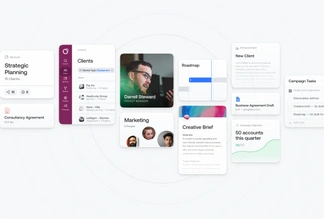
‘ChatGPT effect’ leaves workers unprepared for AI revolution
-
False sense of security as just 11% of workers view AI as an outright threat to their job
-
AI predicted to accelerate the speed of human progress unlike any technology before
-
But ‘pandemic style’ response needed to mitigate against huge economic disruption
20 June 2023, London: Knowledge workers are significantly underestimating the threat posed by artificial intelligence (AI), as new data from Qatalog shows that the perceived threat level has actually fallen since ChatGPT was launched in November 2022, despite recognition that AI helps them work faster.
The finding is taken from The AI Workforce, a new white paper from Qatalog, the intelligent Work Hub. The report also outlines the various ways that AI and large language models (LLMs) could change the nature of work and why an urgent ‘pandemic style’ response is needed.
The ChatGPT effect - ‘A false sense of security’
Qatalog surveyed 2,600 knowledge workers in the US and UK across two surveys to understand their sentiment towards AI. The first survey took place in early November 2022 and the second in April 20231. The findings now act as a snapshot of how workers’ view of AI has shifted since ChatGPT’s launch in late November:
- Proportion of workers who believe more than half of their job can be automated by AI falls from 37% in November to 22% in April.
- Trust in AI’s ability to make important strategic decisions fell from 28% to just 5%
- Similarly, trust in AI’s ability to write important email or memos fell from 32% to 10%
- However, there was a jump in the number of workers who thought AI would help them work faster, rising from 67% to 77%
- Despite this, there was actually a drop in workers who saw AI as an outright threat to their job, dropping from 17% to 11%. However, 46% also see it as both a threat and opportunity, up from 35% in November.
Tariq Rauf, CEO and founder of Qatalog, said:
“For most people, ChatGPT and other similar tools are likely to be the main reference point when it comes to AI. Given its propensity to hallucinate and fabricate information, it’s no surprise that workers don’t trust AI to automate key aspects of their role. Equally, it struggles to join the dots with more complex tasks, and workers appear to have recognised this.
“However, ChatGPT is an early application of large language models and it has masked the true power of this technology, creating a false sense of security. In reality, LLMs are already capable of enabling large-scale automation once leveraged effectively. This isn't happening widely yet, but it’s coming, and it will happen faster than we think.”
Short term vs. long term effects
In the report, Qatalog also outlines some of the likely effects of AI in the next five years:
|
Short-term effects (1-2 years) |
Longer-term effects (3-5 years) |
|
Task automation |
Automation and problem solving is democratized |
|
Improved innovation and problem solving |
Dramatic productivity gains |
|
Job displacement and unemployment |
Role automation |
|
Widening income and skill inequality |
Organizational restructure and fresh job creation |
|
Economic instability |
Exacerbated global inequality |
|
Misuse of AI and ethical concerns |
Entrenched biases |
|
Regulatory and legal challenges |
New era of human-computer interaction |
A ‘pandemic style’ response
Given the potential for large-scale economic disruption, Qatalog argues that governments should act with the same urgency (and level of investment) as they did following the covid-19 pandemic. Some of the actions it recommends include:
-
Research to understand jobs at greatest risk of automation and the changes to human capital requirements for businesses
-
Reskill the workforce with comprehensive training for those at highest risk
-
Mass education to help people understand how these systems work and the potential societal impact
-
Integrate AI into the education system and use it as a tool to enhance teach and interactive learning
-
Invest in nation-level capabilities to avoid richer nations or private companies limiting access to the most powerful models
-
Create a global research and policy task force to
Tariq Rauf, CEO and founder of Qatalog, said:
“Artificial intelligence will accelerate the speed of human progress like no technology before, rapidly expanding the scale and scope of what we can achieve. But it also promises to wreak economic havoc as it automates hundreds of millions of jobs.
“Even a year ago, this might have sounded far-fetched, but almost every week we hear of another large corporate planning to reduce its workforce because of the advances made in AI, and these are just the low hanging fruit. That’s why governments need to act with the same urgency we saw during the pandemic, because the transition will happen faster than we think, and there’s no vaccine this time.”
View the white paper for more detail on the short-term and long-term effects and the policy policy proposals.
-Ends-
-
Survey details: Qatalog surveyed 1,350 knowledge workers from the US and UK during 10th-12th November 2022. The survey was carried out by Attest. Qatalog also surveyed 1,250 knowledge workers from the US and UK during 2nd-4th April 2023. The survey was carried out by Prolific.
Media contacts: Sam Ferris / [email protected]
About Qatalog
Qatalog is the world’s first Intelligent Work Hub. Our mission is to make work effortless, with bespoke software that centralizes people, processes and knowledge. It’s structured and seamlessly connected, meaning work becomes visible, processes are automated, and collaboration is supercharged. Made-to-measure and built to last, it adapts to the changing needs of the business. Founded in 2019, Qatalog has raised $18.5m in venture funding from backers including Atomico, Mosaic, and Salesforce Ventures.
Relevant additional information:



